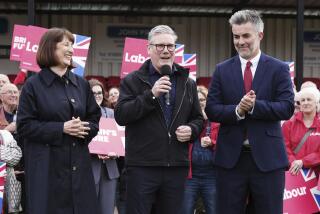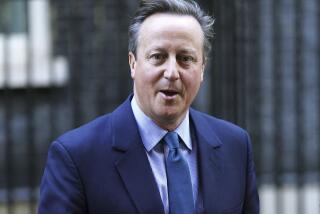Blair Reshuffles Cabinet After Election Losses
LONDON — Reeling from his party’s poor showing in local elections, British Prime Minister Tony Blair fired several senior ministers from his Cabinet on Friday in a sweeping reshuffle intended to reassert his authority and silence party members who want him to quit.
But his most powerful colleague, rival and heir apparent -- Gordon Brown, the treasury chief -- distanced himself from the reshuffle, saying he had not been consulted. Brown also described the voting results as “a warning shot” that showed the Labor Party needed to be “renewed.”
Opposition leader David Cameron, who has led a rejuvenated Conservative Party this year, told reporters: “It will take more than a reshuffle. What we need in this country is a replacement.”
Blair dismissed Charles Clarke as home secretary and stripped Deputy Prime Minister John Prescott of many of his duties, although not his title. Scandals involving the two ministers -- widespread criticism of his agency’s release of foreign convicts in Clarke’s case and an extramarital affair splashed across the tabloid press in Prescott’s -- were seen as having damaged the ruling Labor Party in the run-up to Thursday’s elections. The balloting was held to select more than 4,000 members for 176 councils across England.
But Blair unexpectedly also turned on the rest of his team. He demoted Foreign Secretary Jack Straw, with whom he had disagreed at times over policy on Iraq and Iran, to the less glamorous job of leader of the House of Commons. Geoff Hoon, until Friday leader of the lower house of Parliament, and chief whip Hilary Armstrong also were demoted.
Blair sacked Labor Party Chairman Ian McCartney. And he reshuffled more than half of the rest of the Cabinet to ensure that he was surrounded by stalwart loyalists in key positions.
Margaret Beckett, until Friday the left-leaning environment secretary known for preferring camping vacations in Britain to overseas travel, was named foreign secretary. Scottish lawyer John Reid, one of Blair’s closest allies, was moved to home secretary and replaced as defense secretary by Des Browne.
The scale of the reshuffle took even ministers and aides by surprise, said Anne McElvoy, political analyst and executive editor of the London daily the Evening Standard. She quoted a former Cabinet figure as calling it the “May massacre.” Other commentators compared it to former Prime Minister Harold Macmillan’s 1962 “night of the long knives,” when seven senior ministers were fired.
“Mr. Blair has one aim in mind: to ensure that when the victim count of the May massacre is calculated he will not be among those who perished,” McElvoy wrote. “It is a vast risk: the PM at his most single-minded and merciless -- and evidently convinced that he could not afford to stand still as a shaken party casts around for a scapegoat.”
Thursday’s voting deprived Labor of 16 of the 39 councils it had held, and left it with 251 fewer council members, a worse result than the moderate losses Blair expected. The Conservatives, the main opposition party, claimed victory in 63 councils, a gain of eight, while acquiring 249 more council seats than before. The Conservatives conquered traditionally Labor-voting London.
The results prompted Blair to rush ahead with a reshuffle that had been intended for next week.
Clarke did not take his firing quietly. “I have been sacked from this job,” he said on BBC television. “I do not agree with that judgment.”
Clarke had spent more than a week fighting demands from opposition leaders that he quit. He was under siege in part because his Home Office had released more than 1,000 foreign-born prisoners without deporting them, and some committed more crimes.
Blair told reporters he had offered Clarke several other jobs, but the ousted minister had chosen to return to the back benches in the House of Commons.
Prescott -- whose secretary-turned-lover’s diary, published last weekend, revealed an affair conducted in government-owned offices, cars and homes -- got off more lightly. He remains deputy party leader as well as deputy prime minister, although he lost many of his professional responsibilities.
The turmoil of recent days has given Blair’s already restive Labor colleagues new impetus to call for his resignation. After leading the party to a third general election victory last year with a much reduced majority, Blair promised to stand down before the next general election, due by 2010. The party, worried by the resurgence of the Conservatives, has waited uncertainly to see whether Blair will give any sign of when he might go, most likely to be succeeded by Brown.
On Friday, rebel Labor lawmakers called on Blair to set a clear timetable for leaving office. Backbenchers, meanwhile, were reported to be circulating the draft of a letter calling for Blair to explain how he will carry out his promise to ensure a “stable and orderly transition” of power to his successor.
More to Read
Sign up for Essential California
The most important California stories and recommendations in your inbox every morning.
You may occasionally receive promotional content from the Los Angeles Times.










